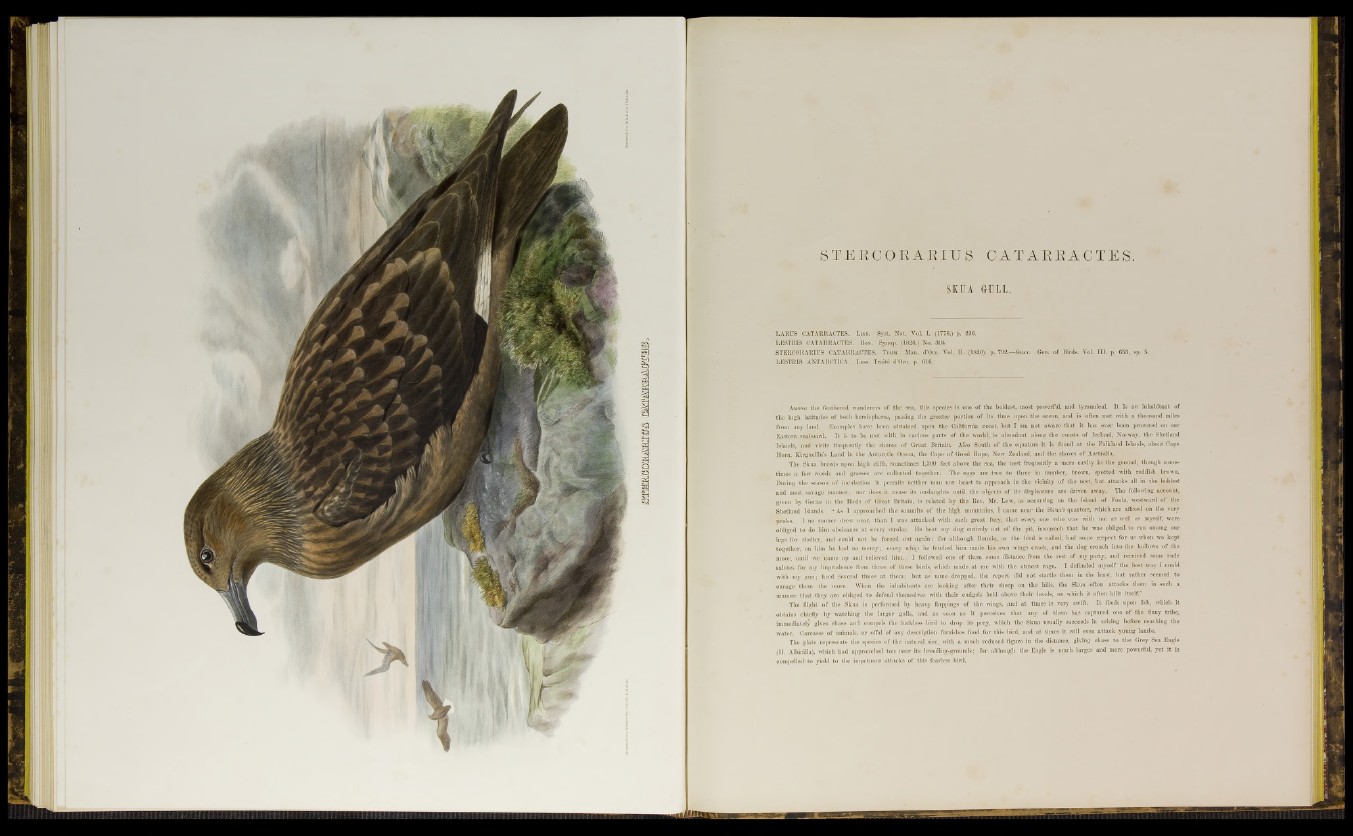
S T E R C O K A E IU S CATAE EAC T E S .
SKUA G U L L .
LARÜS CATARRACTÈS. Linn. Syst. N a t. Vol. I . ; (1776.) p. 226.
LESTRIS CATARRACTES. Bon. Synop. (1826.) No. 304.
STERCORA R lfS CATARRACTES. Tbmm. Man. d’prn.; Vol. II. (1820). p. 792.—Gray. Gen. of Birds. Yol. IE. p. 653, sp. 5.
LESTRIS ANTARCTICA. Less. Traité d’Orri. p. 616.
Among the feathered wanderers of the sea, this species is one of the boldest, most powerful, and tyrannical. It is an inhabitant of
the high latitudes of both hemispheres, passing the greater portion of its time upon the ocean, and is often met with a thousand miles
from any land: Examples have been obtained upon the California coast, but I am not aware that it has ever been procured on our
Eastern .seaboard. I t is to be met with in various parts of the world, is abundant along the coasts of Iceland, Norway, the Shetland
Islands, and visits frequently the shores of Great Britain; Also South o f the equators it is found at the Falkland Islands, about Cape
Horn, Kirguellin's Land in the Antarctic Ocean, the Cape of Good Hope, New Zealand, and the shores of Australia,.
The Skua breeds upon high cliffs, sometimes 1,300 feet above'the sea, the nest frequently a'mere cavity in the ground, though sometimes
a few weeds aud grasses are collected together. The eggs are two to three in number, brown, spotted with reddish, brown.
Benin« the season of incubation it permits neither man nor beast to approach in the vicinity of the nest, but attacks all in the boldest
and most savage manner; nor does i t cease its onslaughts until the objects of its displeasure are driven away. The following account,
given by Gould in the Birds of Great Britain, is related by the Rev. Mr. Low, as occurring on the Island of Foula, westward of the
Shetland Islands. “ As I approached the summits o f the high mountains, I came near the Skua’s quarters, which are affixed on the very
peaks. I no sooner drew near, than I was attacked with such great fury, that every one who was with me as well as myself, were
obliged to do him obeisance at every stroke. Ho beat my dog entirely out of the pit, insomuch that he was obliged to run among our
legs for shelter, and could not be forced out again; for although Bonxie, as the bird is called, had some respect for us when we kept
together, on him he had no mercy; every whip he fetched him made his own wings crack, and the dog crouch into the hollows of the
moor, until we came up and relieved him.. I followed one of them some distance from the rest of my party, and received some rude
salutes for my imprudence from three of these birds, which made at me with the utmost rage. I defended myself the best way I could
with my gun; fired several times at them; but as none dropped, the report did not startle them in the least, but rather seemed, to
enrage them the more. When the inhabitants are looking after their sheep on the hills, the Skua often attacks them in -such a
manner that they are obliged to defend themselves with their cudgels held above their heads, on which it often kills itself.”
The flight of the Skua is performed by heavy flappings of the wings, and at times is very, swift. It feeds upon fish, which it
obtains chiefly by watching the larger gulls, and as soon as it perceives that any of them has captured one of the finny tribe,
immediately gives chase and compels the luckless bird to drop its .prey, which the Skua usually succeeds in seizing before reaching the
water. Carcases of animals, or offal of any description furnishes food for this bird, and at times it will even attack young lambs.
The plate represents the species of the natural size, with a much reduced figure in the distance, giving chase to the Grey Sea Eagle
(II. Albicilla), which had approached too near its breeding-grounds; for although the Eagle is much larger and more powerful, yet it is
compelled to yield to the impetuous attacks of this fearless bird.